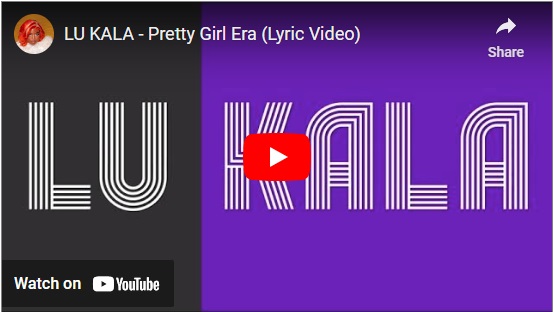Welcome to the LU KALA era.
The pop-forward singer-songwriter is on a years-long roll in her career. She has more than 277,000 followers on TikTok, with more than 218,000 videos posted – almost all created by fans – for her breakout song and self-empowerment anthem, “Pretty Girl Era.” She has more than 50 million streams on Spotify alone, and more than 136,000 followers on Instagram, where several of her reels have topped 1.2 million each. She was featured on Latto’s song “Lottery,” which spent 16 weeks on the Billboard Canadian Hot 100, and has been streamed more than 40 million times on Spotify.
“Pretty Girl Era” resonated strongly with a lot of listeners, to say the least. “It felt good to write a self-love song,” says LU KALA. “I’m happy that people are kind of using it as their theme song. The world would be a better place if everybody woke up and streamed ‘Pretty Girl Era’!” she laughs. She’s obviously joking, but she’s not wrong, either.
While LU KALA is a self-confirmed creator of pop music, she was happy to mix it up with rapper Latto for “Lottery.” “I’d written the hook with some friends, and Latto had heard it, and she was a fan of it,” she says. “I loved when I heard her rap to it, ‘cause I love rap, but I hadn’t seen a world where I ended up mixing with rap music… I’m so happy [to have created a song] where you have a massive pop hook, and then you have a rapper on the verses.”
As is often the case, what appears to be an overnight success was only achieved after a long period of sustained effort. “I’ve been working my butt off for so many years,” says LU. “Just trying to find the opportunity, trying to get people to listen to my stuff. But I think the hustle makes it all worth it. I knew how badly I wanted this, and still want this. It’s just nice to see that my efforts weren’t wasted. I feel like a lot of people would say, ‘You should just give up. This is clearly not going to happen.’ But I was, like, ‘No, this is going to happen. I just haven’t found my tribe yet.”
LU’s Views: Four Tips for Novice Music-Makers
- “Keep working. Don’t give up too soon.”
- “Stop comparing yourself to everybody else.”
- “Master your craft. You can always be better.”
- “Be kind to people. People will not always remember what you say to them, but they will remember how you made them feel.”
For one example of that hard work, LU’s team assigned her the task of writing a new song every day – for a year, not including her regular writing sessions with other people. “And I was willing to do it, because I had to remind myself: how badly do you really want it?” says LU. “When New Year’s, I think it was 2021, hit, my friends were saying, ‘Aren’t you coming out?’ I was saying, ‘No, I have to get this song done.’ They were, like, ‘You work so hard, you’ve got to take some time off.’ I was, like, ‘I understand that you guys feel that way, but I really want it. If I finish in time and I make it, that’s great.’ But I rang in the new year writing songs.”
While she was on the come up, LU KALA co-wrote the song ”Dangerous” with DVSN and Stephen “Koz” Kozmeniuk, that was recorded by Jennifer Hudson, and was often found in writing rooms for others. But she’s always been more devoted to her own career as an artist. “I would perform at showcases, and then get invited by people to come into rooms to write songs,” she says. “That was cool, that was fun, it’s always nice to express yourself, or try to tap into what someone else is going through, and try to express that. But my passion was always my own artistry. I just didn’t know how to make it happen, in the beginning.”
She does now, as befits the unabashed ambition that accompanies her work ethic. “You always want the next win,” says LU. “That’s kind of how my brain works. When we hit 35,000 videos [on TikTok], I was, like, ‘How do we get 50?’ And someone I work with said, ‘No, it’s, how do we hit 100?’ So I was, like, ‘Oh, OK. Let’s hit 100!’”
While that determination sometimes makes it hard for LU to take in some of her big career moments, she does stop occasionally to do so. Like going Top 10 on radio charts in both America and Canada. Or getting her first billboard in Times Square (“That’s always been on my vision board”). Or performing at the 2023 Billboard Women in Music Awards, and meeting Woman of the Year SZA there. “I finally got to meet her, which was amazing,” says LU. “She kind of yelled from across the room, ‘I’m such a fan of yours!’ She came over, and then started complimenting me, and singing ‘Pretty Girl Era’ to me!”
LU has openly spoken about the challenge of being “a plus-size Black woman making pop music,” as she puts it. Perhaps Lizzo has opened that particular door for her, and others? “Pre-Lizzo, [people would doubt] if it was believable, or if it was something that would ‘sell,’ quote unquote,” she says. “Even post-Lizzo, unfortunately, sometimes no matter how hard you try to open the door for those after you, a lot of times the door only opens for you… I sometimes feel like I’m still starting at ground zero, trying to open the door for myself… It’s always tough to break an act that just looks completely different than what you’ve been told pop is supposed to look like. I think that when a lot of people think of pop, they think of, like, thinner, blond hair, blue eyes…
“People say I’m R&B/pop, or just R&B, but I would never get played on R&B playlists, at least not with the things I’ve released to date. It’s like you’re only attaching that to me because I’m Black… But I’m not afraid to go up against the world, and show that, ‘No, this is what I make, and I’m here to stay.’”

